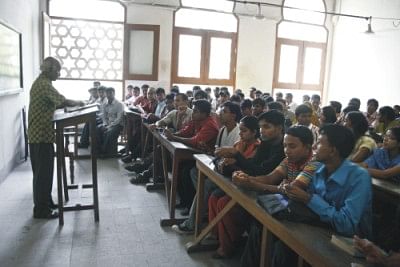Ranking system for our universities

Photo: tanvir ahmed/ drik news
There is no particular ranking among the private universities in Bangladesh. In 2004, the University Grants Commission (UGC) did the first ranking, which ranked North-South University as 1st. After that, no reliable ranking has been done," says WikiAnswers.com.
A reliable ranking system must follow reliable criteria for ranking. But it is worth mentioning that some web sites had tried to grade the positions of the universities through ordinary selection/voting policy. The ranking of universities cannot be done through selection/voting; there are several criteria to measure the real position of a particular university.
The Times Higher Education (THE) World University Rankings system published their annual ranking result for 2010-11 on September 16 in collaboration with new rankings data provider Thomson Reuters. They collected data from more than 50 leading figures in the sector from 15 countries across every continent, and through 10 months of extensive consultation. The guiding principles followed by THE in ranking the world universities, are:
* Teaching: The learning environment (worth 30% of the overall ranking score)
* Research: Volume, income and reputation (worth 30%)
* Citations: Research influence (worth 32.5%)
* Industry income: Innovation (worth 2.5%)
* International mix: Staff and students (worth 5%).
As from the general assessment on THE- World University Rankings Policy, we should evaluate the status of universities by their achievements in each particular field. The ranking system will show the achievement of each university in its each particular field, by which people may be able to know which one is better and how it has become better. Regarding our country, the scoring should be divided as follows:
* On research and innovative activities;
* On the quality of teachers;
* On the number of students admitted each year;
* On th number of international students;
* On campus quality and status (including library and all other facilities), and
* Overall score.
A university can be in a good position, like Dhaka University, North-South University, Shajalal University of Science and Technology etc., but that does not mean that a less familiar university cannot surpass them.
Nowadays, the number of private universities is increasing gradually; consequently, the arena of higher education is becoming more competitive day by day. In today's "global village" this type of competition is not contained within borders, just as a country's economy is in contest with another country's economy. Similarly, a student from India studying at Harvard University is a competitor of a Bangladeshi student who is reading at Dhaka University. But it is worth mentioning that we are lagging too far behind in the global race.
The UGC has some plans that can light the candle of higher education. As an example, I want to mention the UGC Awards. To recognise and encourage university teachers for their fundamental research work and publication, the UGC introduced the awards in 1980. Twelve awards are given annually in the following areas:
* Arts and Humanities, Law and Education: 2;
* Social Science: 2;
* Physical and Biological Science: 2;
* Agriculture Science: 2;
* Engineering and Technology: 2;
* Medical Science: 2.
The value of each award is at present Tk.20,000 and a certificate and an Honourable Crest. So far, a good number of professors have been given this award for their contribution to fundamental research in the country.
It is a worrying aspect for all private universities of Bangladesh that they are not allowed to offer PhD due to lack of facilities, so we hope that facilities will be developed in course of time.
The UGC also offers different types of fellowships, which are vital for development of our country's higher education. If all universities encourage their teachers by giving such awards, based on their innovative work and research, it would bring better result for our countr's higher education sector.

 For all latest news, follow The Daily Star's Google News channel.
For all latest news, follow The Daily Star's Google News channel. 



Comments